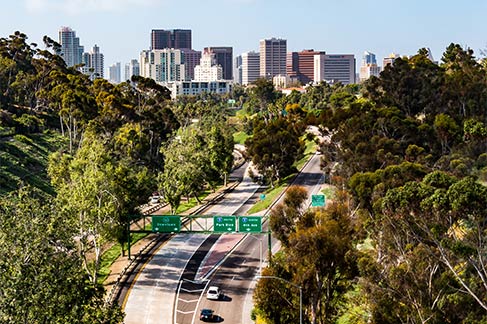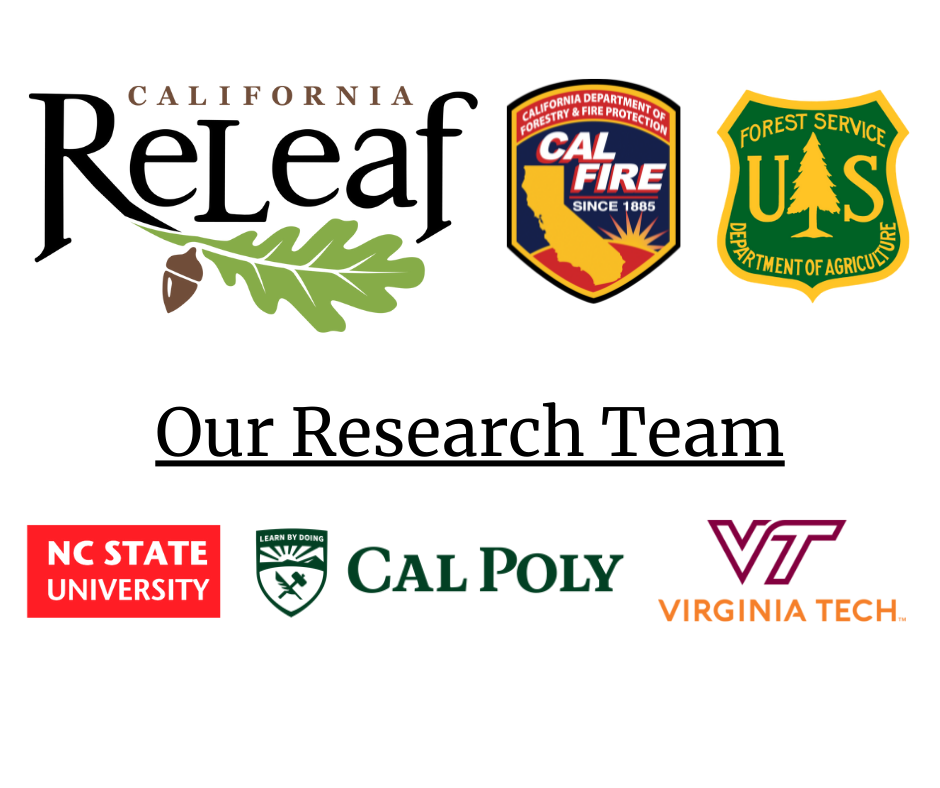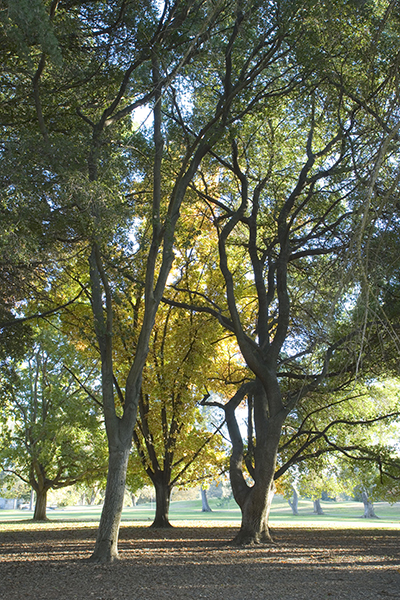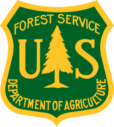Research Project
Economic Impacts of Urban & Community Forestry in California Study
About the Study
California ReLeaf and our team of researchers are conducting an economic impacts study on Urban and Community Forestry in California. Your organization’s response to our survey will help guide future efforts to support urban and community forest enterprises in the state.
Please learn more about the study and our survey by reviewing our Frequently Asked Questions section as well as our history and background of the study below.


Study Definition of Urban and Community Forestry
Frequently Asked Questions about the Survey
Who is Conducting the California Urban & Community Forestry Study?
The study on the economic impacts of Urban and Community Forestry is being conducted by California ReLeaf, the California Department of Forestry and Fire Protection (CAL FIRE), and the USDA Forest Service in partnership with a national team of researchers from North Carolina State University, Cal Poly, and Virginia Tech. You can learn more about the background of the study, our research team, and our advisory committee below.
If you have questions about the survey or study, please contact or lead researcher Dr. Rajan Parajuli and his team: urban_forestry@ncsu.edu | 919.513.2579.
What Type of Information Will I be Asked in the Survey?
- Your organization’s total sales/revenues/expenditures related to urban and community forestry during 2021.
- Number and type of employees
- Salaries and fringe benefits of employees
Why Should I Participate?
The data collected in the confidential survey will help our team of researchers report on California’s Urban and Community Forestry monetary contributions and economic impacts, which are critical to governmental policy and budget decisions at the state and local levels.
How Much Time Will the Survey Take to Complete?
The survey will take approximately 20 minutes to complete.
Who in My Organization Should Take the Survey?
Have someone familiar with your organization’s financials complete the survey. We only need one response per organization.
Which Organizations Should Take the Survey?
Businesses and organizations working with community trees, i.e., tree care and green industries, municipal tree managers, utility forestry managers, college campus arborists, and nonprofits and foundations should take our survey.
-
- Private Sector – Respond on behalf of a company that grows, plants, maintains, or manages trees in the urban forest. Examples include nurseries, landscape installation/maintenance contractors, tree care companies, utility vegetation management contractors, consulting arborists, companies providing urban forest management services.
-
- County, Municipal or other Local Government – Respond on behalf of a division of local government that oversees the management or regulation of urban forests on behalf of citizens. Examples include departments of parks and recreation, public works, planning, sustainability, forestry.
-
- State Government – Respond on behalf of a state agency that performs technical, administrative, regulatory, or outreach services for urban and community forestry, as well as agencies that oversee the management of urban forests. Examples include forestry, natural resources, conservation, and cooperative extension.
-
- Investor-Owned or Cooperative Utility – Respond on behalf of a company that operates utility infrastructure and manages trees along rights-of-way in urban and community settings. Examples include electric, natural gas, water, telecommunications.
-
- Higher Education Institution – Respond on behalf of a college or university that directly employs personnel who plant, maintain, and manage trees on campuses in urban and community settings or is involved in research and/or educating students on U&CF or related fields. Examples include campus arborist, urban forester, horticulturist, grounds manager, professor of U&CF programs.
-
- Non-Profit Organization – Respond on behalf of a non-profit whose mission directly relates to urban and community forestry. Examples include tree planting, maintenance, conservation, consultation, outreach, education, advocacy.
Will My Response be Confidential?
All of your responses to this survey are confidential, and no personally identifying information will be recorded, reported, or published anywhere. Information you share will be aggregated with other respondents for analysis and will not be reported in any way that may reveal your identity.
Top 5 Reasons to Take the Survey
1. The Economic Impacts Study will quantify U&CF’s value and monetary benefits to the state’s economy in revenue, jobs, and gross domestic product.
2. Current U&CF economic data is critical to policy and budget decisions at the local, regional, and state levels that impact private, public, and nonprofit sectors.
3. U&CF organizations will benefit from the data and reports that will be made available after the study is complete for the entire state and select large state regions, e.g. Los Angeles, Bay Area, San Diego, etc.
4. The Economic Impact Study report will help you communicate the economic value of U&CF organizations’ to policymakers and help you advocate on behalf of U&CF enterprises at the local, regional, and state level.
5. The Economic Impact study will detail how U&CF private businesses and public and nonprofit organizations contribute toward job creation, growth, and ongoing employment throughout California.
Our Research Team
Dr. Rajan Parajuli, PhD
North Carolina State University
Rajan Parajuli, PhD is an Assistant Professor with the Department of Forestry and Environmental Resources at North Carolina State University (Raleigh, NC).
Dr. Stephanie Chizmar, PhD
North Carolina State University
Stephanie Chizmar, PhD is a Post doctoral Research Scholar within the Department of Forestry and Environmental Resources at North Carolina State University (Raleigh, NC).
Dr. Natalie Love, PhD
California Polytechnic State University San Luis Obispo
Natalie Love, PhD is a Postdoctoral Research Scholar in the Biological Sciences Department at CalPoly San Luis Obispo.
Dr. Eric Wiseman, PhD
Virginia Tech
Eric Wiseman, PhD is an Associate Professor of Urban and Community Forestry within the Department of Forest Resources and Environmental Conservation at Virginia Tech (Blacksburg, VA).
Brittany Christensen
Virginia Tech
Brittany Christensen is a Graduate Research Assistant within the Department of Forest Resources and Environmental Conservation at Virginia Tech (Blacksburg, VA).
Advisory Committee

100k Trees 4 Humanity
Utility Arborist Association
LA Conservation Corps
Santa Clara County Office of Sustainability
L.E. Cooke Company
California Landscape Contractors Association
Society of Municipal Arborists
UC Cooperative Extension
San Diego Gas & Electric and Utility Arborist Association
North East Trees, Inc.
CA Department of Water Resources
USDA Forest Service Region 5
Western Chapter ISA
California Landscape Contractors Association
City of Carmel-by-the-Sea
Cal Poly Pomona
Davey Resource Group
California Dept. of Forestry and Fire Protection CAL FIRE
Sponsoring Partners


